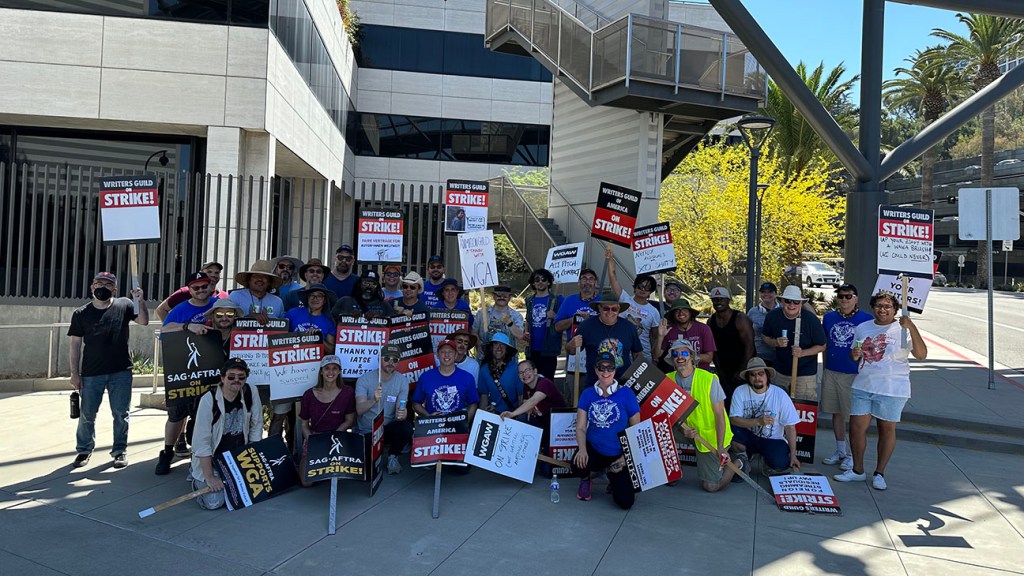
With great corporate power should come great responsibility. And with that ethos in mind, comic book creators joined WGA members on the picket line Thursday, protesting what they called the exploitation of the most vulnerable.
About 40 or so creators(some WGA members, some not) joined the proceedings at one of the gates outside of NBCUniversal on Lankershim Boulevard, with writers such as Eisner winner Pornsak Pichetshote (The Good Asian), Marc Bernardin (Adora and the Distance, Picard), Jeremy Adams (Green Lantern), David Avallone (Elvira), Emmy winners Shawna and Julie Benson (Batgirls and the Birds of Prey), and Lucifer showrunner Joe Henderson (Skyward). Rantz Hoseley, the Eisner-winning editor-in-chief of Z2 comics and independent filmmaker, organized the gathering.
“This is one of those pivotal moments in history,” Hoseley, taking a moment in the shade of the NBCUniversal tower, told The Hollywood Reporter. “The idea of recognized authorship, the controls and limitations of corporate use of AI and elimination of human creators — comic book creators are interested in the outcome because these are things that affect all of us.”
Comics, especially those published by Marvel and DC, have been the engines of the movies business since the 2000s. Marvel Studios movies alone have grossed almost $30 billion worldwide, yet the writers and artists behind its stories and characters have mostly seen little in recompense. Marvel creators, for example, generally receive $5,000 when their characters appear in Marvel movies, while TV appearances can be just a few hundred dollars.
“You have comic book creators and writers and artists that can’t even afford to get health insurance,” said Deric A. Hughes, who has written both television scripts for shows such as Flash and Arrow as well as comics. “They had to go do GoFund Me to ask people to pay for their health coverage.”
Among those creators who have turned to crowdfunding for help is War Machine co-creator Len Kaminski, with a GoFundMe launched in May following car accident.
Hughes noted that writer and artists have historically been taken advantage of, even in publishing heydays.
“They were never given a piece of the pie years ago, and it is that exploitation that carried over once these corporations got involved. The least protected will be most exploited,” Hughes said.
The plight of the indie comic creator may be even more dire. Hoseley, who has served an editorial roles at Heavy Metal, Dark Horse Comics and Fantagraphics, said the margins are low (or even negative) for most creators who are toiling at night, raising money for printing, and trying to find comic shops that will give them shelf space.
“They do it because they love the medium, and it’s a love that gets exploited,” said Hughes.
The comic creators on the picket line wanted higher minimums for their work, as well as transparency from streamers. They would also like to see studios paying more to acquire the rights to characters for film and TV.
“The option fees are ridiculously low. For a studio to pay $100,000 for the acquisition plus backend, it’s nothing to their bottom line,” said Hoseley. “But for an independent comic book creator, that is literally life-changing money. That is money that ensures that a comic creator can feed their family, that they can have a degree of stability if terms of housing, good, child care. The inequity here is staggering and frustrating.”
AI is another concern for the writers, with Hughes noting he heard that one person in Artist Alley at San Diego Comic-Con was asked to leave when it was discovered that this person was selling AI-generated art.
But Hoseley said the corporation should fear this beast as well, and that it’s plausible AI could be used to create unauthorized fan-ficiton to compete with what the studios are making.
Said Hoseley: “You’re putting yourself in the position where your trademarked IP, which is your entire value to your stockholder, is slipping through your fingers.”













